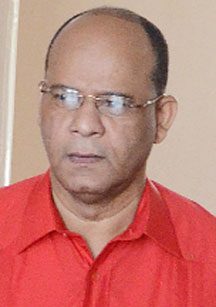PPP General Secretary Clement Rohee says shared governance with the PNCR or the AFC is not realistic until the opposition parties take significant steps towards correcting the untrustworthy atmosphere that he blames them for creating.
Rohee, speaking at the PPP press conference yesterday, was responding to the assertion that his party embraces a winner takes all approach to governance. The assertion was made last Friday by A Partnership for National Unity (APNU) leader David Granger, who said national unity is essential for moving forward, and called on government to abandon what the coalition sees as its winner take all approach to politics in favour of shared governance and inclusionary democracy.
Rohee, however, accused Granger of “parroting” views he says have been held by the PPP since its inception and views which the PNCR, of which Granger is also leader, shunned during its tenure as the executive government.
R

ohee referred to all statements made by Granger and decisions taken by APNU as PNCR decisions and statements.
The General Secretary further said that the PNCR and the AFC have worked together to deny the PPP/C executive government powers and responsibilities which it ought to be guaranteed by virtue of its executive status.
He also said the two opposition parties denied the PPP/C the Deputy Speaker position in the National Assembly; gave themselves majority standing in all standing and special committees of the National Assembly, leaving government with the least seats; and moved a no-confidence motion against him in his capacity as Home Affairs Minister. Rohee also noted that the opposition parties have voted to cut the budget every year since gaining the majority in the National Assembly. He argued that these acts have served to muddy the political atmosphere, and diminish the levels of trust between the parties to levels lower than where they were pre-2011. He, therefore, concluded that there can be no shared governance under such conditions, and offered that the opposition parties must first take a plethora of actions to make the atmosphere conducive to shared governance.
Concessions
One such action includes giving the Deputy Speaker’s post, currently held by APNU MP Basil Williams, to the government. Rohee said the PPP/C, when it held the majority of the National Assembly, always allowed the opposition to have the Deputy Speaker role while it kept the Speaker’s post. Now, he noted, the opposition parties have decided to keep both posts.
It should be noted that when government and the opposition parties were called to nominate candidates to hold the Speaker and Deputy Speaker portfolios following the 2011 elections, the PPP/C only chose to nominate a candidate for the position of Speaker while the opposition nominated candidates for both positions.
Because the opposition parties held the majority, a candidate from the opposition ranks, then AFC prime ministerial candidate Raphael Trotman, received the needed votes to become House Speaker. Since there were no nominations from the government side for the post of Deputy Speaker, Deborah Backer, an APNU MP, won the nomination for the post. Following Backer’s passing this year, Williams took up the portfolio.
Rohee also said the PPP wants the membership of the National Assembly’s standing and select committees to reflect government’s executive status. In other words, he wants the seats reallocated so that government has a majority seating in the various committees, despite its minority status in the National Assembly. Such a change, he explained, will proportionately reflect government’s power.
The PPP/C would also require the opposition parties to recognise and respect that the executive government has the right to bring the national budget to the National Assembly and have the last say with regard to the amounts therein. The opposition parties have combined to slash the 2012, 2013 and 2014 budgets.
Rohee also said the PPP would like to see the opposition parties to quit linking conditions to the passage of the Anti-Money Laundering and Countering the Financing of Terrorism (AML/CFT)(Amendment) Bill. Currently, APNU demands government’s cooperation on its attempts to pass several amendments to the Principal Act, and the president’s assent to several bills passed by the National Assembly before it supports the passage of the bill. AFC, on the other hand, wants government to set up and operationalise the Public Procurement Commission in exchange for its support to pass the bill.
The inability of government and the opposition parties to broker an amicable solution has led to gridlock, causing the country to miss three regional deadlines for the upgrading of the legislation and resulting in a call for countries in the region to take countermeasures against risks emanating from Guyana.
Rohee told reporters these are but a few of the steps the opposition parties would need to take before an atmosphere of trust is restored, and before government even contemplates shared governance.
When asked why government does not first offer the opposition parties a compromise, he said the opposition parties have the majority in the National Assembly, and has some things they can give. “Why are we always looking to the government to compromise?” Rohee asked, noting that the government is the executive, and makes decisions based on the constitution. “If you want an atmosphere of trust, you have to cede something,” he continued.
Following the press conference, Stabroek News asked Rohee if government would not itself start working towards creating an atmosphere conducive to trust, and by extension shared governance, by satisfying at least one of the opposition’s demands. “Well that’s something we can think about,” he said in response.




